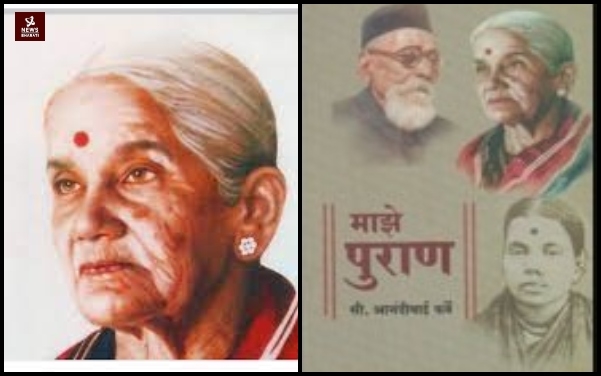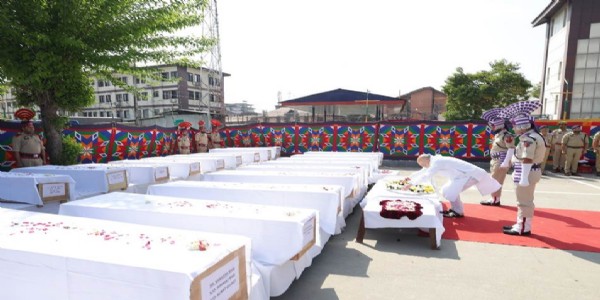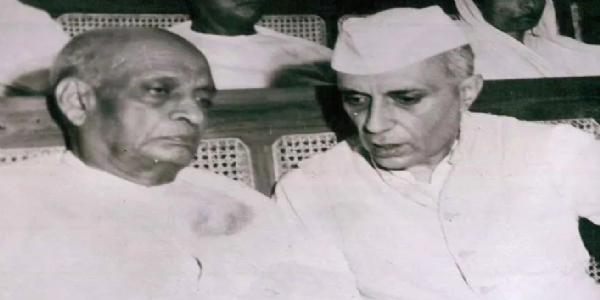Baya alias Anandi Bai Karve: The Incredible Journey Everyone Needs To Know - VII
Total Views | 177
Her visit to Africa and her thoughts on many aspects of life.
Baya collected 3000 shillings in Africa. She could not sit idle, so started collecting Bhaubij, it kept her active. The routine of Dr Shanker was very disciplined, he, his wife Mrs Revati, and children had a busy routine, Baya hardly had anything to do, this made her feel a little unhappy. The activity of Bhaubij kept her meaningfully busy.

When Baya helped well-off people, they paid her well, of course, she helped many women without asking for money. She saved money thinking if she was left behind after Anna, she would need it. Anna gave her money for her necessary expenses, but she never had anyone as house help, which resulted in saving. She would give money to the Deccan Education Society or Women's University when Anna was running it, with a condition that the interest would be given to her till she was alive. Later the money was to be used as a donation to the institution or the interest to be used as a scholarship.
Though she collected Bhaubij for many years during Diwali, she realized that she may not be able to continue the activity for a long time. So she appealed to all to donate once as it was difficult for her to contact all. Rs 3500 were collected, and she added money which she saved and donated 5000 to the Bhaubij fund. The interest of Rs 150 was given to Bhaubij.
Anna gave her RS 15 per month, and she needed hardly 300-400 for a year. She received interest on the amount invested, so barely used Anna's money.
The primary unit of the Ashram was named Anandi Bai Karve Primary School ( this primary unit is still running as a practicing school and has a D Ed uni attached to it )when she stayed in Hingane in a room, she opened a school for farmer's daughters. It could get the grant of the local body too, later it was merged into the Ashram, but it did not have an independent building, so Baya proposed to spend her 12000 RS after her death for the building.
Baya had the satisfaction that she was not a liability to anyone, she had sufficient money to spend on herself. One is really surprised at her being fiercely independent. She was far ahead of her time. She stayed alone for a long time, and came to Ashram only when she was unable to carry on alone after the accident. Once she came to the Ashram, she accommodated herself well to the Ashram routine and never complained about anything.
Baya noted many incidents that she experienced at the different stages of life in society. The plight of child widows was that they really had to work hard at home but they were treated to be unauspicious by the people. They had to face difficult situations sometimes, Baya too has noted such episodes from her life. She managed to keep herself safe, but it throws light on the predicament of child widows or maybe it can be described as a complicated situation of women. On this background, the value of Anna's work is understood with great reverence.
Baya was very courageous and fearless. She even lit pyres on a couple of occasions and performed the last rites for a couple of women as per their last wish or the situation then, if a newborn was delivered dead, she would complete all the formalities alone. The time she ventured in, talking about all such things were unheard of, did not have social sanction too.
After her marriage Baya took charge of the family matters as Anna used to be busy and on travel too. He had a very busy routine, and could hardly get time for sitting at home. Probably he was man of few words, but Baya handled the situation skillfully. He would give his opinion only when asked for, but never insisted that it had to be followed. Many karyakartas ( a modern term ) got connected with him, some left him but he treated everyone with love and respect, and never criticized. He was always absorbed in his work, and mostly never paid attention to anything besides his work.
He never recommended his sons anywhere, anytime. Baya described him to be self-consciously timid but once he made a decision then at any cost he would complete the task. He had no special demand for a particular food, he would eat whatever was cooked by Baya at home. He loved walking anytime anywhere.
He always gave money for the education of his sons as a loan, and Baya at times felt a little upset. Anna was very particular about money, his economic dealings were absolutely transparent, Baya too imbibed his quality naturally. He can be described as a balanced and totally focused person in modern terms, Baya gave the credit of her independence to his non-interfering attitude. She always thought that women have to work with resolve to support the family well. She was extremely proud of Anna's work, and whatever help she could offer, she did it happily.
With Anna, Baya too evolved, if one looks at her journey, it is unimaginable. She was an extremely independent person. Her views on some points are astonishingly rational and progressive. She was against the wastage of food on any occasion. She was against extravagant expenditure on the occasions like marriage. She was never an idol worshiper but believed in some kind of power that runs the world. She developed this attitude due to her father, he gave importance to helping and treating everyone as a human being in spite of the caste. Anna too treated his work as God.
Working consistently was her worship, she could not just sit doing nothing. She represents Indian women whose hard work has no limit, once convinced they silently work to practice what they believe in without expecting any reward or even acknowledgment. Every time one reads the book, one comes across some new aspect of her personality. If one looks at the starting point of her life, one is amazed at the feat she achieved, especially when she consistently had to face resistance from society. Her way of dealing with it was not easy, she tried to help people around society which softened the reaction to an extent later. Probably she was well aware of the pace of social change, she did not complain or turn bitter.
Initially, when she came to stay at Hingane in the last phase of her life, she would walk around, visit the school, the Ashram, the girls' hostel, teachers, and staff quarters and talk to them. Gradually this became difficult for her, for the last few months she could not move out of the small house. In the early years of Ashram, she stayed with the girls there and her journey had an end in the same house.
Her samadhi is in the Sanstha along with Anna and Parvati Bai, one can visit it.
(Wish to write on the life of Parvati Bai Athawale, Baya's sister who came to Hingane for the education of her son, and stayed till the end of her life. She too wrote Mazi Kahani )
The younger generation needs to know about such women who shaped our lives and paved the way for us all.
(5/6/1863 - 29/11/1950) - 29th of this month is her death anniversary, let us light a panati in her memory that would illuminate our lives.
Baya collected 3000 shillings in Africa. She could not sit idle, so started collecting Bhaubij, it kept her active. The routine of Dr Shanker was very disciplined, he, his wife Mrs Revati, and children had a busy routine, Baya hardly had anything to do, this made her feel a little unhappy. The activity of Bhaubij kept her meaningfully busy.

Bhaubij
When Baya helped well-off people, they paid her well, of course, she helped many women without asking for money. She saved money thinking if she was left behind after Anna, she would need it. Anna gave her money for her necessary expenses, but she never had anyone as house help, which resulted in saving. She would give money to the Deccan Education Society or Women's University when Anna was running it, with a condition that the interest would be given to her till she was alive. Later the money was to be used as a donation to the institution or the interest to be used as a scholarship.
Though she collected Bhaubij for many years during Diwali, she realized that she may not be able to continue the activity for a long time. So she appealed to all to donate once as it was difficult for her to contact all. Rs 3500 were collected, and she added money which she saved and donated 5000 to the Bhaubij fund. The interest of Rs 150 was given to Bhaubij.
Anna gave her RS 15 per month, and she needed hardly 300-400 for a year. She received interest on the amount invested, so barely used Anna's money.
The primary unit of the Ashram was named Anandi Bai Karve Primary School ( this primary unit is still running as a practicing school and has a D Ed uni attached to it )when she stayed in Hingane in a room, she opened a school for farmer's daughters. It could get the grant of the local body too, later it was merged into the Ashram, but it did not have an independent building, so Baya proposed to spend her 12000 RS after her death for the building.
Some aspects of Baya's life values
Baya had the satisfaction that she was not a liability to anyone, she had sufficient money to spend on herself. One is really surprised at her being fiercely independent. She was far ahead of her time. She stayed alone for a long time, and came to Ashram only when she was unable to carry on alone after the accident. Once she came to the Ashram, she accommodated herself well to the Ashram routine and never complained about anything.
Baya noted many incidents that she experienced at the different stages of life in society. The plight of child widows was that they really had to work hard at home but they were treated to be unauspicious by the people. They had to face difficult situations sometimes, Baya too has noted such episodes from her life. She managed to keep herself safe, but it throws light on the predicament of child widows or maybe it can be described as a complicated situation of women. On this background, the value of Anna's work is understood with great reverence.
Baya was very courageous and fearless. She even lit pyres on a couple of occasions and performed the last rites for a couple of women as per their last wish or the situation then, if a newborn was delivered dead, she would complete all the formalities alone. The time she ventured in, talking about all such things were unheard of, did not have social sanction too.
Baya portrayed Anna
After her marriage Baya took charge of the family matters as Anna used to be busy and on travel too. He had a very busy routine, and could hardly get time for sitting at home. Probably he was man of few words, but Baya handled the situation skillfully. He would give his opinion only when asked for, but never insisted that it had to be followed. Many karyakartas ( a modern term ) got connected with him, some left him but he treated everyone with love and respect, and never criticized. He was always absorbed in his work, and mostly never paid attention to anything besides his work.
He never recommended his sons anywhere, anytime. Baya described him to be self-consciously timid but once he made a decision then at any cost he would complete the task. He had no special demand for a particular food, he would eat whatever was cooked by Baya at home. He loved walking anytime anywhere.
He always gave money for the education of his sons as a loan, and Baya at times felt a little upset. Anna was very particular about money, his economic dealings were absolutely transparent, Baya too imbibed his quality naturally. He can be described as a balanced and totally focused person in modern terms, Baya gave the credit of her independence to his non-interfering attitude. She always thought that women have to work with resolve to support the family well. She was extremely proud of Anna's work, and whatever help she could offer, she did it happily.
Baya, a mother figure to all
With Anna, Baya too evolved, if one looks at her journey, it is unimaginable. She was an extremely independent person. Her views on some points are astonishingly rational and progressive. She was against the wastage of food on any occasion. She was against extravagant expenditure on the occasions like marriage. She was never an idol worshiper but believed in some kind of power that runs the world. She developed this attitude due to her father, he gave importance to helping and treating everyone as a human being in spite of the caste. Anna too treated his work as God.
Working consistently was her worship, she could not just sit doing nothing. She represents Indian women whose hard work has no limit, once convinced they silently work to practice what they believe in without expecting any reward or even acknowledgment. Every time one reads the book, one comes across some new aspect of her personality. If one looks at the starting point of her life, one is amazed at the feat she achieved, especially when she consistently had to face resistance from society. Her way of dealing with it was not easy, she tried to help people around society which softened the reaction to an extent later. Probably she was well aware of the pace of social change, she did not complain or turn bitter.
Initially, when she came to stay at Hingane in the last phase of her life, she would walk around, visit the school, the Ashram, the girls' hostel, teachers, and staff quarters and talk to them. Gradually this became difficult for her, for the last few months she could not move out of the small house. In the early years of Ashram, she stayed with the girls there and her journey had an end in the same house.
Her samadhi is in the Sanstha along with Anna and Parvati Bai, one can visit it.
(Wish to write on the life of Parvati Bai Athawale, Baya's sister who came to Hingane for the education of her son, and stayed till the end of her life. She too wrote Mazi Kahani )
The younger generation needs to know about such women who shaped our lives and paved the way for us all.
(5/6/1863 - 29/11/1950) - 29th of this month is her death anniversary, let us light a panati in her memory that would illuminate our lives.
Bharati Web








